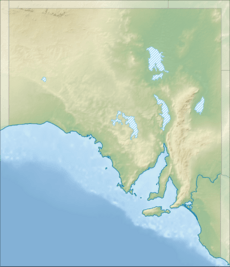Munga-Thirri—Simpson Desert Conservation Park facts for kids
Quick facts for kids Munga-Thirri—Simpson Desert Conservation ParkSouth Australia |
|
|---|---|
|
IUCN Category Ia (Strict Nature Reserve)
|
|

Rangers looking at Approdinna Attora Knolls in the Munga-Thirri—Simpson Desert Conservation Park
|
|
| Nearest town or city | Oodnadatta |
| Established | 14 December 1967 |
| Area | 6,932.68 km2 (2,676.7 sq mi) |
| Managing authorities | Department for Environment and Water |
| Website | Munga-Thirri—Simpson Desert Conservation Park |
| See also | Protected areas of South Australia |
Munga-Thirri—Simpson Desert Conservation Park (formerly Simpson Desert Conservation Park and Simpson Desert National Park) is a protected area located in the Australian state of South Australia about 970 kilometres (600 mi) north of the state capital of Adelaide and above 215 kilometres (134 mi) north-east of the town of Oodnadatta.
The conservation park occupies land within the Simpson Desert in the gazetted locality of the same name. It is bounded by the borders of the Northern Territory and Queensland to its north and by the Munga-Thirri–Simpson Desert Regional Reserve to its west, south and east.
The land within the boundaries of the conservation park first obtained protected area status on 14 December 1967 as a national park proclaimed under the National Parks Act 1966. On 27 April 1972, the national park was reconstituted as the Simpson Desert Conservation Park upon the proclamation of the National Parks and Wildlife Act 1972. As of 2018, it covered an area of 6,932.68 square kilometres (2,676.72 sq mi). On 2 August 2018, the conservation park's name was altered by the Government of South Australia to Munga-Thirri—Simpson Desert Conservation Park.
In combination with Simpson Desert Regional Reserve and Witjira National Park, it forms a protected area representing one of the world's best examples of dunal desert. A wide variety of desert flora and fauna are protected in a landscape of varied dune systems, extensive playa lakes, spinifex grasslands and Acacia woodlands. These trees soak up water from underground water springs.
In an unprecedented move, it and the Simpson Desert Regional Reserve were closed to public access by the state government from 1 December 2008 to 15 March 2009 due to extreme heat during the Australian summer.
The conservation park is classified as an IUCN Category Ia protected area. In 1980, it was listed on the now-defunct Register of the National Estate.
 | Ernest Everett Just |
 | Mary Jackson |
 | Emmett Chappelle |
 | Marie Maynard Daly |


